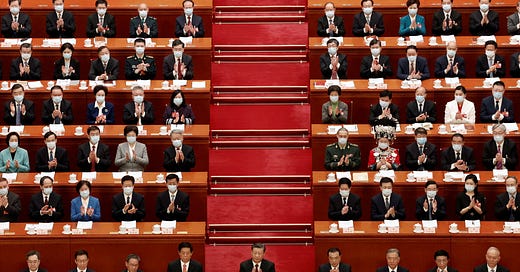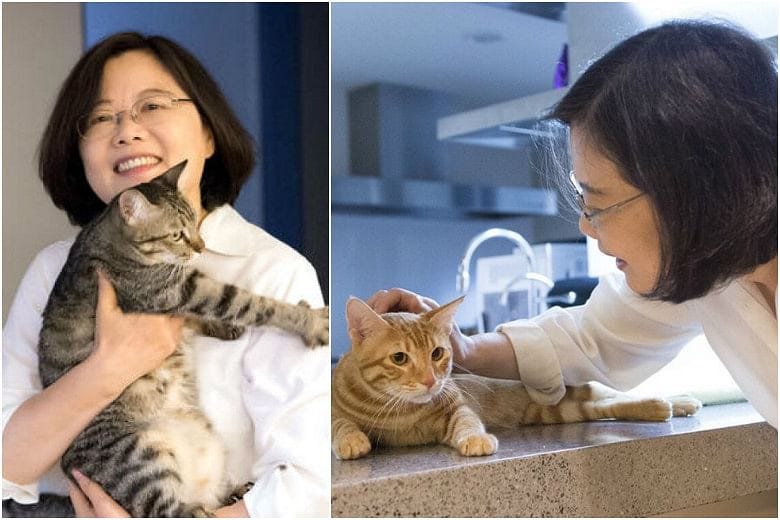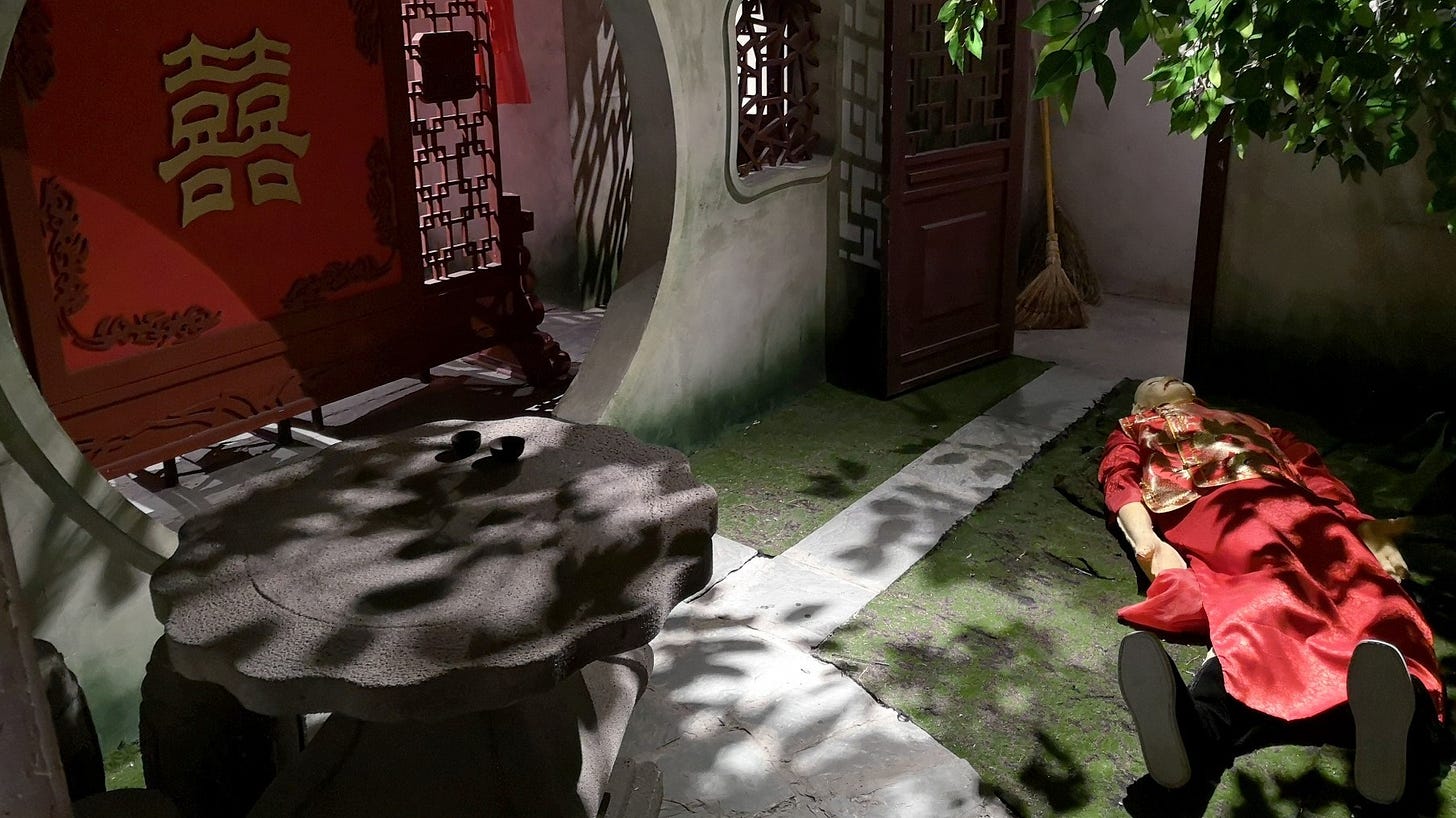Top 10 NPC Delegate Proposals: AI, Escape Rooms, Baby Making, and Taiwan
Why escape rooms are corrupting the youth, Chinese AI development, recognizing the work of couriers, and a Taiwan “kill list”
China’s annual Two Sessions (两会) — made up of the National People’s Congress (NPC) and the Chinese People’s Political Consultative Conference (CPPCC) — came to an end last month.
But away from headlines of announcements such as a beefed-up military budget, a lower growth target, Xi’s extended presidency, and Li Qiang’s confirmation as premier, the Two Sessions is also a chance for representatives from around China to bring their ideas to the table and submit proposals. This wrinkle of “Chinese democracy” ChinaTalk’s favorite part of the Chinese political calendar.
Delegates often raise awareness of issues in their industries — many submit proposals related to the sectors they work in — and highlight changes they think need to be made to legislation. They range from more germane changes in welfare policy and healthcare to discussions of tech and digitization to much more out there attacks on Taiwan and, er, escape rooms.
Here are the ten hottest proposals that people have been discussing in state and social media.
How to Beat OpenAI: A Chinese NAIRR
Zhou Hongyi (周鸿祎), founder of 360 Group and CPPCC member, said that China should prioritize the development of its own large-scale AI model.
Firstly, the country should establish a collaborative innovation model between large technology companies and key research institutions to promote large-scale model technology, said Zhou.
This approach would be similar to the “Microsoft + OpenAI” combination, which has already led the way in the development of large-scale AI models.
Secondly, Zhou recommends supporting the establishment of several long-term open-source projects for large-scale AI models. These projects would create an open innovation ecosystem for the development of these models through crowdsourcing.
Zhou sees the development of large-scale AI models as a potential new industrial revolution and believes that China should strive to catch up in this field.
His AI proposal is one of three that Zhou has put forward. He also advocates for more support for digital transformation at SMEs and enhanced urban digital security.
Check out more about AI proposals at the Two Sessions here.
Make the metaverse great again
The metaverse may seem very 2021, but for NPC member Min Weidong (闵卫东) — Dean of Metaverse Research at the Institute of Nanchang University and a central committee member of the agricultural and workers’ democratic party — the technology still has a lot of untapped potential.
“Metaverse development still faces technological bottlenecks, with many core technologies yet to be resolved in areas such as metaverse headsets, close-range displays, natural interaction, and large-scale scene generation,” Min said, according to Sina.
Despite these challenges, he argues that the metaverse has a wide range of potential applications, including gaming, entertainment, shopping, services, data mining, and the creation of new businesses.
To realize the full potential of the metaverse, Min emphasizes the need for standardization and interoperability within the technology.
The popularization and promotion of the metaverse will require an increase in the number of people participating in the metaverse market, as well as the formulation of relevant laws, regulations, and policies to safeguard the security of virtual economies and the data, information, and property involved in metaverse applications, he added.
Min is not only a proponent of the metaverse, but also an advocate for the responsible development of artificial intelligence. He suggests that AI should be viewed with an open, inclusive, and positive attitude, utilizing its advantages while avoiding its potential negative effects to bring more convenience and progress to our lives.
He recommends further research and development in the field of AI, as well as the promotion of legislation to ensure that its implementation is fair and responsible. His suggestions include national coordination of AI legislation, improving existing laws and regulations, and innovating legal implementation methods.
ChinaTalk is a reader-supported publication. To receive new posts and support my work, consider becoming a free or paid subscriber.
The essayist who wants Taiwan separatists on a “kill list”
Essayist, blogger, and CPPCC member Zhou Xiaoping (周小平) recommends imposing sanctions and punishments on “separatist figures” and “pro-independence Taiwanese companies.”
He suggests creating a blacklist for such entities, claiming they will collaborate with foreign entities to “disrupt the great cause of the reunification of the motherland, create division, sell secrets, and hollow out industries.”
Those on the list would be ordered to stop all acts of Taiwan independence within a certain time period and confess their crimes. Persistence would result in carte blanche to arrest or kill those on the list during special operations against Taiwan.
Zhou also wants to see the state compile and issue a sanctions and punishment list of Taiwanese foundations, companies, and capital that provided funds or donated political contributions to the Democratic Progressive Party or other Taiwanese separatists. He believes that “iconic independence figures” should not be granted any amnesty.
“Of course, we must not only support and win over the pro-unification faction in Taiwan Province, but also educate and win over those in Taiwan Province who are blinded by separatist thinking,” he added.
But he caveats this all by saying that there should be no amnesty for iconic figures who have been seriously influenced by separatist thought and have already set off enormous public outrage among the masses on the Chinese internet and given rise to strong antipathy to their fellow netizens.
Zhou also outlines his recommendations for what should happen “after reunification,” including boosting Taiwan’s industrial supply chain, improving Taiwan’s infrastructure, and enhancing the employment environment and other areas of people’s livelihood.
“Further, these measures to benefit Taiwan must be put into effect only after reunification, so as to strengthen the hopes and beautiful envisionings of ordinary people in Taiwan Province for post-reunification life,” he said.
The curious case of the murder mystery
In a post which attracted a lot of interest on Weibo, Li Xiaoxuan (李孝轩) — a member of the National Committee of the CPPCC and the deputy head of the Yunnan Provincial Committee of the Democratic League — proposed escape rooms and murder mystery games be included in the scope of legislation and regulation.
According to a report, he said some murder mystery companies mix unhealthy elements such as otherworldly horror, bloody violence, personality split, and soul possession in their business projects.
He’s concerned because many underage students are immersed in them, causing some to have serious mental disorders and even commit crimes.
With the rapid development of the economy and society, the incidence of adolescent psychological problems and mental disorders has been increasing year by year, highlighting the inadequate supply of professional services for young people, and the prominent problem is that some emerging industries have induced new hidden dangers, he explained.
He advocates having a government body review each game script and establishing a restrictive rating mechanism to track and monitor them.
The annual operating revenue of escape room and murder mystery games in China hit 20 billion RMB in 2021, according to the “China Immersive Script Entertainment Industry Research Report (2021-2022),” jointly released by the China Cultural and Entertainment Industry Association and Meituan Research Institute.
It’s not the first time legislation has been proposed to cover them, particularly when it comes to minors.
Shanghai already does this. It introduced regulations this month that require operating units to register their scripts with the cultural and tourism bureau within thirty days of putting them on the shelves, along with content-dependant age restrictions.
In December 2022, the Market Management Department of the Ministry of Culture and Tourism urged regions to speed up the regulation of these industries.
Zhao Changlong (赵长龙) — CPPCC National Committee member and full-time deputy chairman of the Tianjin Municipal Committee of the Democratic Progressive Party — is pushing the implementation of new professional standards for these sorts of games. That includes professional training, assessment, and certification for murder mystery game skills to provide practitioners with a clear career development outlook.
In addition, to address the shortage of high-quality scripts, Zhao suggested attracting more talent to participate in their creation, establishing a copyright protection mechanism and database for scripts, and promoting secondary processing and profit of the scripts.
“If we can protect the copyright of these works and carry out secondary development, such as digitalizing some content of the script and using virtual simulation to teach, or combining the script content with traditional tourism, upgrading the traditional explanation mode to a more immersive live theater, it can not only enable authors to earn more revenue and enhance their creative enthusiasm, but also create more social value,” he said.
The birds, the bees, and the Chinese government
The Chinese government has been encouraging people to have more children since 2015, when they changed the one-child policy to a two-child policy. It’s resulted in a modest increase in births.
However, some policymakers feel that this increase is not enough.
Ding Zuohong (丁佐宏), a CPPCC member and chairman of the board at Yuexing Group, believes that incorporating education about marriage into curricula, a public dating service, and reducing the financial burden on parents who want to have a third child could help.
He notes that the decline in fertility levels is mainly due to the reduction of women of childbearing age, as well as societal pressures such as the burdens of parenting and education, career advancement, along with changing views on marriage and childbearing.
Ding proposed incorporating family life and marriage education into school curricula to guide young people in establishing the correct idea regarding choosing a spouse — including not casting judgment on the basis of a family’s status or betrothal gifts.
He also suggests building high-integrity public service platforms for dating and marriage and incorporating the costs of childbirth into the social security system.
At the societal level, Ding suggests enhancing flexible workdays, researching incorporating the costs of childbirth into the social security system, and alleviating workplace discrimination due to maternity leave, as well as increasing the construction of kindergartens and issuing subsidies to preschool families with children aged five and under.
Additionally, he proposes one-time rewards and educational subsidies for families with two or three children and increasing personal income tax deductions for parents of two- and three-child families.
At the national level, Ding proposes a policy where preschool, compulsory education, and university education are completely free for the third child. By reducing the burden of raising children for two- and three-child families, Ding believes that support for childbearing policies can be further strengthened.
Longer Spring Festival Holidays
Making up for national days off by working on weekends has long been an unpopular policy in China. This year, two NPC members want to change that.
The first proposal was put forward by Zhao Wanping (赵皖平), an NPC representative and deputy director of Anhui Agricultural Sciences Institute. On February 28, he posted on social media that the flexible working system — through which extra days off are added to holidays falling on certain days to create longer weekends which then have to be made up for — should not only be canceled, but the three-day holiday for Spring Festival should also be extended to five days.
This year during the Spring Festival, people had three official holidays from January 23 to 25. The Thursday and Friday of that week were then also turned into holidays to create seven consecutive days off, with the two extra days being made up on the following Saturday and Sunday.
Under Zhao’s proposal, the holiday, including weekends, would be extended to a total of nine days, making it easier for people to travel and see family.
The holiday system has undergone several iterations as lawmakers try to cater to people wanting to visit their families in other parts of the country versus employers who say that longer holidays are too expensive for them and politicians who worry about people having too much leisure time.
In addition to Zhao’s proposal, Li Chuyuan (李楚源), the Party Secretary and Chairman of Guangzhou Pharmaceutical Holdings Limited, also put forward a proposal to extend the Spring Festival and add an extra day off for Lantern Festival.
Zhao’s proposals, however, go beyond extending holidays. He also wants to bring back fireworks and firecrackers, which have been banned in hundreds of cities across the country since the 1980s.
He suggests that the traditional New Year celebration be reintroduced through public displays for citizens. He also advocated classifying fireworks for individual use according to their danger.
A “Courier Day” could recognize the vital role of delivery workers in China
With almost 6 million express delivery workers and 8 million take-out delivery workers in China, Wang Yong (汪勇) — SF Express Hubei Branch Manager and NPC representative — proposes creating a new holiday to recognize their contributions.
“I hope to be able to establish a holiday for express and take-out delivery workers, and hope it will give them a better sense of recognition and achievement as they are working,” he stated.
“I have come to realize more and more deeply that our express delivery industry is an industry that safeguards people’s livelihoods — whether it is on weekdays or in case of need, this group of express delivery workers constitutes the lifeblood of a city, and will certainly look after and provide for every family.”
He nominated February 1 as a potential date, and what the day would entail isn’t clear — but Wang aims to enhance understanding and empathy for delivery workers. He acknowledges the long hours that require both physical exertion and interpersonal skills, as well as the stress they experience when, for instance, they receive negative ratings from customers for factors beyond their control.
Wang is a former courier who joined SF Express nine years ago. During the pandemic, he gained attention for organizing volunteers to support medical workers and hospitals in Wuhan.
He facilitated transportation for medical staff at Wuhan Jinyintan Hospital, helped with their food deliveries, and secured donations and supplies. On one occasion, he even raised 100,000 RMB to purchase down jackets for medical staff working in cold conditions.
Next up, coverage of proposals to:
Fight scammers with social credit scores
Socialize medicine
Regulate livestreaming e-commerce






